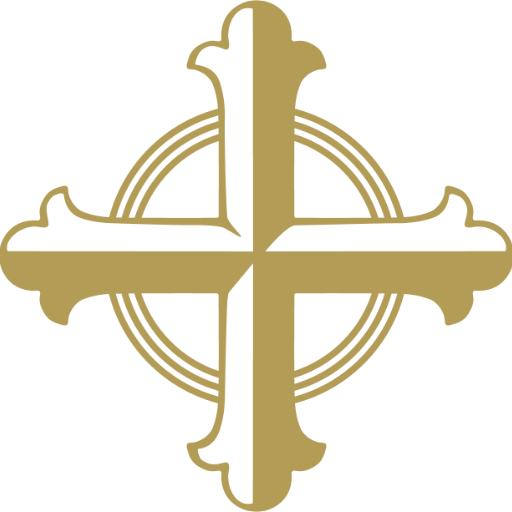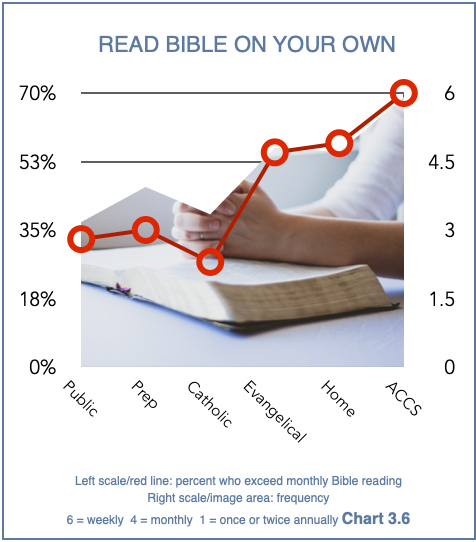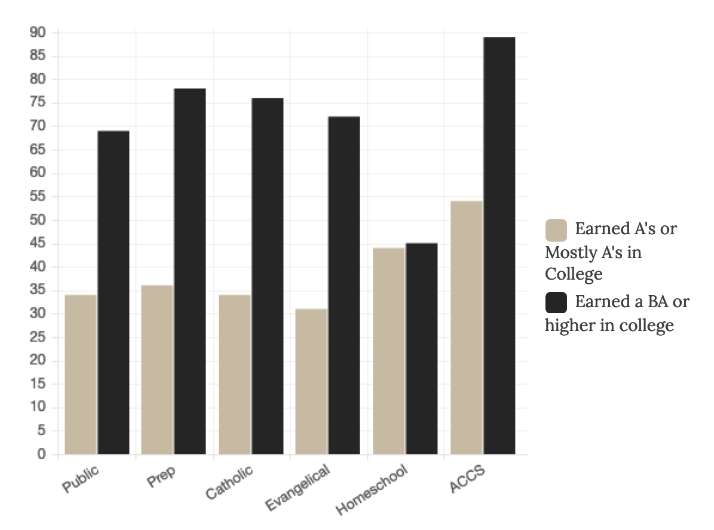What is Classical Christian Education?
Classical Christian schools are different because they start with different goals.
ACCS schools have been called a “pearl of great price” in education: greatly valued by those who understand its potential, but largely unrecognized by those who do not.

Education that Inspires Depth and Wisdom
Classical Christian education (CCE) is a time-tested educational system which establishes a biblical worldview (called Paideia), cultivates the seven Christian virtues, trains students in reasoning through the Trivium (Grammar, Logic, and Rhetoric), and engages children in “the great conversation” through the historical Great Books.
Paideia
We understand the importance of culture and learning everything from a Christian worldview. We teach people – immortal souls.
Liberal Arts
We study the liberal arts of language – the Trivium – and the liberal arts of numbers and harmony – the Quadrivium.
Great Books
We read the classics, interact with questions and ideas throughout history, study history and art, and do it all with a Biblical framework.
“The scholar has lived in many times and is therefore in some degree immune from the great cataract of nonsense that pours from the press and the microphone of his own age.”
– C.S. Lewis
We Consider Great Books, Art, and Stories.
Students engage great books and art containing rich stories that shape both the soul, literary understanding, and moral imagination. A rich and nuanced command of language plays an unsung role in understanding God’s word, and in understanding our fellow man.
And, a thorough immersion in the study of history using original sources helps students step outside their own times and places and consider the world from very different vantage points. Going ad fontes – meaning to the source in Latin – means we primarily read original sources and generally avoid textbooks for history and literature.
![]()
We Use a Biblical Framework to Understand Everything.
This is more than adding a Bible verse to the curriculum: when history, science, math, philosophy, art, and other subjects are integrated around the truth that God is the Creator of all that exists, we see that all knowledge is interrelated and points back to Him. Theology is the queen of the sciences, with all subjects understood through the revealed word of God and natural/human history and philosophy.
Biblical standards of conduct are applied in all arenas of school life, acknowledging that Jesus Christ is Lord of all. The schools acknowledge that God has given parents the responsibility for the education of their children and that the schools instruct those students under the parents’ delegated authority. Most graduates remain faithful to Christ even through college and have a heart to serve others.
![]()

Make connections with an integrated humanities core based in great books, philosophy, history and classic literature, and theology.
Thrive with techniques like socratic, round-table discussion, persuasive writing and speaking, and recitation.
Learn foundational skills like writing and arithmetic through imitation and practice. Learn math logically in the Quadrivium.
Great art that has stood the test of time emphasized in the fine and performing arts: music, visual art, etc.

Education that Trains to Think and Speak
We train students to lead with eloquence:
Our method is based in the tradition of the Trivium, part of the Liberal Arts tradition. Through employing the principles of Grammar, Logic, and Rhetoric, children develop clear thinking and a masterful command of spoken and written language.
“If education is beaten by [vocational] training, civilization dies.”
-C.S. Lewis

We encourage hard work:
Students are capable of achieving much more than is commonly thought, and therefore classical Christian schools have high expectations for student learning. Students learn to love the subjects that their teachers love and cheerfully follow the godly example of their instructors. Students with a classical Christian education experience the personal satisfaction that is inherent in mastering a difficult task.
“By teaching them to read, we have left them at the mercy of the printed word. By the invention of the film and the radio, we have made certain that no aversion to reading shall secure them from the incessant battery of words, words, words. They do not know what the words mean; they do not know how to ward them off or blunt their edge or fling them back; they are a prey to words in their emotions instead of being the masters of them in their intellects… We have lost the tools of learning…”
– Dorothy Sayers
Find books to answer your questions about CCE here.
We understand that all education is Paideia:
Paideia is a Greek word for the education that shapes a person and a culture. Paideia is powerful because it influences who we are in a deep way that is almost imperceptible to us– it’s woven into us from childhood. We’re intentional about the kind of people and the culture encouraged in school. If you spend a day in a conventional high school talking to students, and then spend a day with classical Christian high-schoolers, we think you’ll see the difference.
“Fathers, do not provoke your children to anger,
but bring them up in the paideia
and instruction of the Lord.”
– Ephesians 6:4
“Education is not a subject, and it does not deal in subjects.
It is instead the transfer of a way of life.”
– G.K. Chesterton
We cultivate rightly ordered affections – the ancient concept of virtue:
This might sound strange, or foreign. But since the time of the early church, Christians have been about training students to love the True, the Good, and the Beautiful. This only happens when we rightly order our loves so that we first love God, and next our neighbor.
We promote a Christian community:
A classical Christian school is a community of parents and teachers who share a commitment for teaching children to love learning and grow in godliness. Smaller class sizes ensure that teachers know their students and are better able to serve them individually. Students know they are loved and not just another face in the crowd.
The schools acknowledge that God has given parents the responsibility for the education of their children and that the schools instruct those students under the parents’ delegated authority.
Structure and beauty characterize the environment with great art, uniforms, and organized, structured learning.
We’re not so much about
teaching
as we are about
forming the soul.
We’re not so much about
subjects
as we are about
virtue.
We’re not so much about
making a living
as we are about
living for a higher purpose.

More About Paideia
Tens of thousands of parents are embracing classical Christian K-12 schools because they can see the difference — parents who want their children to flourish in life, not just get by. And they want this for their children’s whole life, not just for college. This is a gift you can give your child in the Christian paideia.
Classical Christian schools were uniquely designed to help parents obey Paul’s instruction in Ephesians, “And you, fathers, do not provoke your children to wrath, but bring them up in the paideia of the Lord.” In the first century to the 19th, classical Christian education was the way Christian parents cultivated a Christian Paideia in their children.
Paideia is powerful because it influences who we are in a deep way that is almost imperceptible to us– it’s woven into us from childhood. If you spend a day in a conventional high school talking to students, and then spend a day with classical Christian high-schoolers, we think you’ll see the difference.
If you listen to educators today, you’ll typically hear one common goal: “College and Career Readiness.” But what if students were asked to rise to a greater purpose? Parents at classical Christian schools are realizing that their kids can rise to something greater, something deeper, if we dare to imagine it. We disciple students to love great art, great books, and to appreciate the Greatness of God. And when they come near graduation after a decade or more in classical Christian schools, people notice something.
No form of education can compare to the success seen within classical Christian schools.
If education is beaten by [vocational] training, civilization dies. – C.S. Lewis

More about Our Curriculum
- We build around a Humanities core, based in great books, theology, philosophy, and history.
- Socratic discussion, commonplacing (journaling great ideas & support), and a variety of engaging methods based in classical tradition create a very different classroom experience.
- Structure and beauty characterize the environment with great art, uniforms, and organized, structured learning.
- The quadrivium provides a philosophical approach to learning about our world including number, geometry (shape), astronomy (motion), and music (ratios and proportions).
- Theology is the queen of the sciences, with all subjects understood through the revealed word of God and natural/human history and philosophy.
- Great art is emphasized in the fine and performing arts.
- Christian community extends beyond the classroom to the school culture, with intentional focus on the cultivation of virtue, as a practice.
- The traditions of the church provide and inform the pursuit of the 7 Christian virtues, etc.
From the Trivium and Quadrivium, to Latin and Greek, to the cardinal virtues, to the great books; classical Christian methods sound foreign. But they have served the church for centuries. And, they are excelling today in ACCS member schools.
It’s time to rethink education.
“Smooth runs the water
where the brook is deep.”
– William Shakespeare


